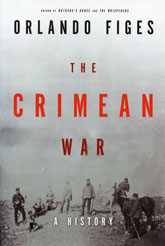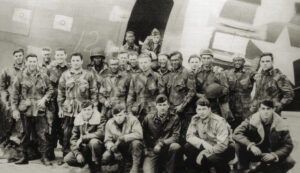
The Crimean War A History
By Orlando Figes. 576 pp. Metropolitan, 2011.
Reviewed by Jeremy Black
Besieging Sevastopol in 1854, Thomas Molyneux Graves, a British officer, captured the unrelenting intensity of battle during the Crimean War: “A few days will show an immense number of guns in battery and when our fire opens it will be tremendous…now I am so accustomed to the noise that I believe I could go to sleep in a battery when the enemy were firing at it.”
The Crimean War is often remembered for accounts such as this one, which shows the 19th century coming to grips with mechanized warfare. The political dimensions of the conflict are well known. What opened in 1853 as a struggle between Russia and Turkey widened the next year when Britain and France came to the support of the Turks. Napoleon III sought prestige in order to strengthen his domestic position and enhance France’s diplomatic situation. The British, exaggerating the threat from Russia, wished to prevent it from dominating the Black Sea and the Balkans, thus threatening the overland route to India.
As Orlando Figes valuably shows, there was more to the war than this. Its root causes included a struggle for primacy between Catholicism and Russian Orthodoxy. In February 1855 fears of an invasion led the Russians to plan the kind of partisan warfare that helped stop Napoleon’s famous 1812 march. Orthodox priests were sent to the Ukraine to incite faithful peasants to wage a holy war against invaders. Figes also links the ferocity displayed by Russian troops to their anger over Allied desecration of Orthodox churches.
Known for his bestselling histories of Russia (as well as a recent confession to posting anonymous Amazon reviews that criticized his rivals’ work), Figes writes well and has an eye for telling quotations. He thoughtfully sketches the origins of the struggle, and adds an intriguing epilogue about the war in myth. For the first time in British history, Figes notes, the common soldier, not just the nobleman, was hailed as a hero.
The Crimean War, however, is not the definitive history claimed by its publicists. Russian, French, and Ottoman sources are used to effect, but do not lead to any substantial revision of the established account of the fighting. The Baltic aspect of the struggle, so ably discussed by British naval historian Andrew Lambert, is largely neglected, while events in the Far East are ignored. Both of these omissions are unfortunate. The Baltic was of particular strategic significance; the Allies were far more powerful at sea (the Russian navy was capable of beating the Turks, but not the British) and naval operations in the Baltic gave the Allies a chance to strike at the heart of Russian power, St. Petersburg.
In the introduction, Figes complains that “the Crimean War has been left mainly in the hands of British military historians…who have constantly retold the same stories.” Yet because his book leaves out critical parts of the war’s history, it cannot be the final word.
Jeremy Black, who teaches history at the University of Exeter in England, is the author of several books, including The Age of Total War, 1860–1945.





